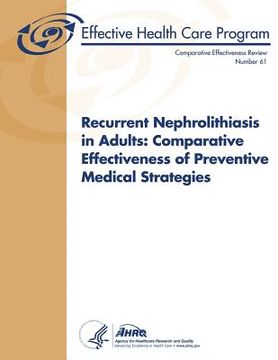Recurrent Nephrolithiasis in Adults: Comparative Effectiveness of Preventive Medical Strategies: Comparative Effectiveness Review Number 61 (en Inglés)
Reseña del libro "Recurrent Nephrolithiasis in Adults: Comparative Effectiveness of Preventive Medical Strategies: Comparative Effectiveness Review Number 61 (en Inglés)"
Nephrolithiasis is a condition in which hard masses (kidney stones) form within the urinary tract. These stones form from crystals that separate out of the urine. The lifetime incidence of kidney stones is approximately 13 % for men and 7 % for women. Reports conflict regarding whether incidence is rising overall, but consistently report rising incidence in women and a falling male-to-female ratio. Direct medical expenditures associated with kidney stones may exceed $4.5 billion annually in the U.S. Approximately 80 % of adults with kidney stones have stones consisting predominately of calcium oxalate and/or calcium phosphate, with most remaining patients having either struvite or uric acid stones. Many patients with kidney stones have low urine volume and/or one or more biochemical abnormalities, including hypercalciuria, hyperuricosuria, hyperoxaluria, hypocitraturia, and either low or high urine pH. Risk of kidney stones also may be increased by medical conditions such as primary hyperparathyroidism, obesity, diabetes, gout, and intestinal malabsorption, and by anatomic abnormalities such as medullary sponge kidney and horseshoe kidney. Previous systematic reviews of randomized controlled trials (RCTs) of dietary and pharmacological therapies have reported that increased fluid intake, thiazide diuretics, and citrate pharmacotherapy reduce stone recurrence, but that evidence was insufficient regarding the efficacy of other pharmacological treatments. Clinical guidelines recommend that patients who experience kidney stones undergo a laboratory evaluation, including analysis of stone composition and possibly of urine and blood biochemistries. Unclear, however, is whether pretreatment laboratory test results predict effectiveness of treatment on stone recurrence and other clinical health outcomes, or whether treatment tailored to pretreatment laboratory results is associated with better clinical health outcomes than empiric therapy. Nor have followup biochemical test results been proven as valid surrogates for predicting the effectiveness of treatment in preventing stone recurrence. Clinical uncertainty exists regarding the effectiveness, comparative effectiveness, and adverse effects of dietary and pharmacological preventive treatments; the value of urine and blood biochemical measures for initiating and/or modifying treatment; and the potential impact of patient and stone characteristics on important treatment outcomes. This systematic review and meta-analysis attempts to comprehensively address these questions. We developed an analytic framework that incorporated six Key Questions and specified the patient populations, interventions, comparisons, outcomes, and harms of interest. The Key Questions were: 1. In adults with a history of nephrolithiasis, do results of baseline stone composition and blood and urine chemistries predict the effectiveness of diet and/or pharmacological treatment on final health outcomes and intermediate stone outcomes, and reduce treatment adverse effects? 2. In adults with a history of nephrolithiasis, what is the effectiveness and comparative effectiveness of different dietary therapies on final health outcomes and intermediate stone outcomes? 3. In adults with a history of nephrolithiasis, what is the evidence that dietary therapies to reduce risk of recurrent stone episodes are associated with adverse effects? 4. In adults with a history of nephrolithiasis, what is the effectiveness and comparative effectiveness of different pharmacological therapies on final health outcomes and intermediate stone outcomes? 5. In adults with a history of nephrolithiasis, what is the evidence that pharmacological therapies to reduce risk of recurrent stone episodes are associated with adverse effects? 6. In adults with a history of nephrolithiasis being treated to prevent stone recurrence, do results of followup blood and urine biochemistry measures predict final health outcomes and intermediate stone outcomes?

